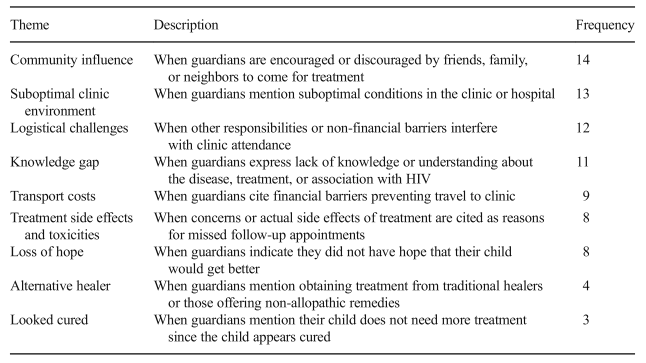March 2018- We examined risk factors and reasons for treatment abandonment among Malawian children with lymphoma, the most common pediatric cancer in SSA.
Risk factors and reasons for treatment abandonment among children with lymphoma in Malawi
Stanley, Christopher C; van der Gronde, Toon; Westmoreland, Kate D; Salima, Ande; Amuquandoh, Amy; Itimu, Salama; Manda, Agness; Mtete, Idah; Butia, Mercy; Mpasa, Atupele; Wachepa, Stella; Fox, Paula; Wasswa, Peter; Kazembe, Peter; El-Mallawany, Nader K; Gopal, Satish.
Supportive Care in Cancer
Access the text here.
Purpose
Lymphoma is the commonest pediatric cancer in sub-Saharan Africa (SSA). Frequent treatment abandonment contributes to suboptimal outcomes. We examined risk factors and reasons for treatment abandonment for this population in Malawi.
Methods
We conducted a mixed methods study among children < 18 years old with newly diagnosed lymphoma, prospectively enrolled during 2013-2016. All children received standardized diagnosis and treatment, and were followed for up to 2 years. Treatment abandonment was defined as failure to attend prescribed chemotherapy within 4 weeks, or post-treatment visit within 3 months. Child, guardian, and household characteristics associated with treatment abandonment were assessed. Semi-structured interviews were conducted with primary caregivers of children experiencing treatment abandonment.
Results
Of 121 children with newly diagnosed lymphoma, 72 (60%) had complete information regarding child, guardian, and household characteristics. Of these, 56 (78%) had Burkitt’s and 16 (22%) Hodgkin’s lymphoma. Forty-nine (68%) were male, median age was 10.6 years (interquartile range [IQR] 7.9-13.0), and 26 (36%) experienced treatment abandonment. Lack of guardian education and travel time >= 4 h to clinic were independently associated with treatment abandonment, with adjusted hazard ratio (aHR) 3.8 [95% confidence interval (CI) 1.5-8.9, p = 0.005] and aHR 2.9 (95% CI 1.2-6.9, p = 0.019), respectively. Commonest reasons for treatment abandonment endorsed by 15 guardians were community influence, suboptimal clinic environment, logistical challenges, transport costs, treatment toxicities, loss of hope, alternative healers, and beliefs about cure.
Table 3: Themes emerging in semi-structured interviews focused on treatment abandonment among pediatric lymphoma patients in Lilongwe, Malawi

Conclusions
These findings highlight families at risk for treatment abandonment, underlying reasons, and opportunities to improve retention in care for pediatric cancer patients in SSA.